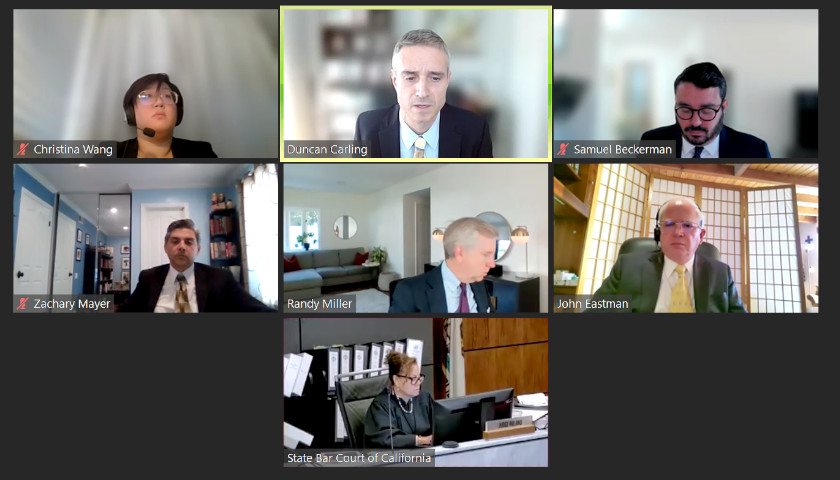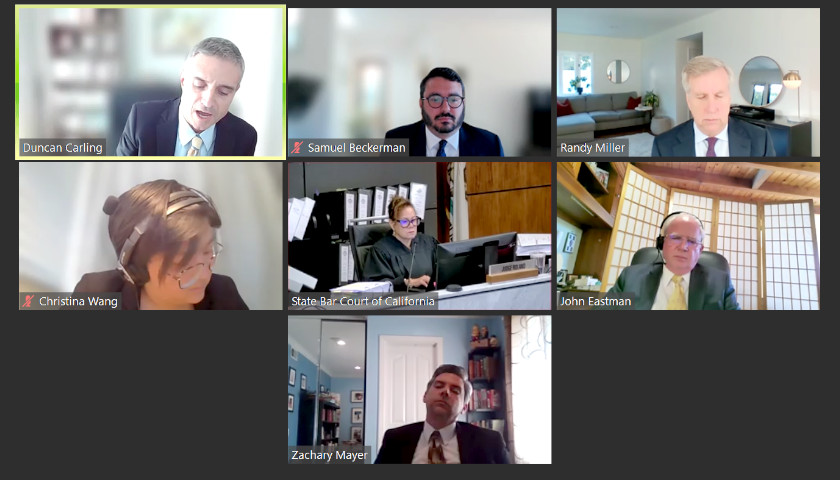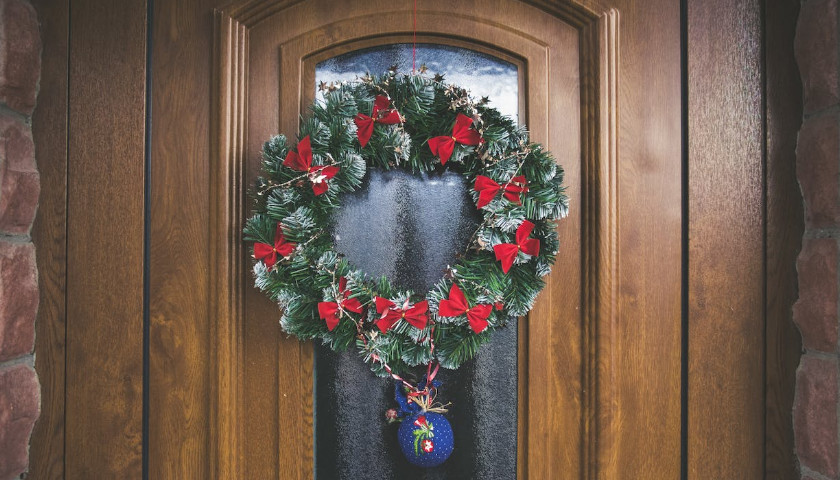The disbarment trial of Donald Trump’s former attorney and constitutional legal scholar, John Eastman, began its final week Monday, as the renowned former law clerk for Supreme Court Justice Clarence Thomas handled hours of cross-examination from State Bar of California attorney Duncan Carling. The California Bar is attempting to disbar Eastman over advice he gave Trump’s legal team regarding former Vice President Mike Pence accepting electoral slates from states suspected of election fraud in the 2020 election.
Carling asked Eastman about his belief that tens of thousands of mail-in ballots were returned in the 2020 Pennsylvania election before the date they were mailed out and wanted to know how Eastman figured out what the mailed-out date was. Eastman, who is prohibited from looking at any documents while testifying unless placed on the screen for the court, responded, “Footnote 1 of your exhibit 132.”
During direct examination, Eastman’s attorney, Randy Miller, asked him about Attorney General Bill Barr’s statement that he found no fraud significant enough to affect the 2020 election. Eastman said there was a problem with this statement because Barr only mentioned fraud; he didn’t mention all the illegal activity. He said he didn’t consider it conclusively closing the door into investigating the election for that reason. His own investigation found that the illegalities affected many more ballots than the margins of President Joe Biden’s win over Trump in the swing states. He noted that “the head of the Election Integrity Unit at the DOJ had resigned in a huff,” the unit continued to refuse to approve investigations into election corruption that U.S. Attorneys requested to conduct. Eastman said the lack of DOJ investigations “raised serious questions” whether Barr’s statement was accurate, and since his research contradicted Barr’s statement, he “didn’t give it much credence.”
To try and discredit the Arizona legislators who wrote letters to Pence expressing their concerns about certifying the election, Carling asked Eastman about testimony that former Speaker of the House Rusty Bowers gave to Congress stating there was no election fraud. Bowers, who blocked election integrity election while serving in the legislature, was ousted from office in the Republican primary last year by over a 22 percent margin.
Carling pointed out to Eastman that while many state legislators sent letters to Pence expressing their disagreement about certifying the results, they didn’t constitute majorities within those state legislatures. He displayed a chart showing 34 legislators from Pennsylvania, 17 from Arizona, 15 from Wisconsin, 14 from Georgia, and 11 from Michigan who signed the letters. In Arizona, that constituted 52 percent of Republican legislators and 28 percent of all the legislators.
Also, Eastman was asked about an email he sent on December 20, 2020, to an unidentified person where he said he did not support advocating for martial law. He also said that unless states’ alternate electoral slates are certified by their state legislatures, they will be “dead on arrival in Congress.”
Carling repeatedly tried to get Eastman to admit that Trump tweeted about the possibility of Pence rejecting electoral slates due to Eastman’s advice. However, Eastman’s testimony during the trial has been that he offered Trump’s team various options in his memo, and he thought delaying the certification was a better option than rejecting the electoral slates. Eastman told Carling he did not talk to Trump about his tweets and pointed out that a memo authored by someone else had been circulated around the White House in December 2020 known as “Operation Pence Card,” which advocated for rejecting electoral slates.
CBS News reported in August, “On Dec. 23, Trump retweeted a memo called Operation ‘PENCE’ CARD, which falsely claimed the vice president could unilaterally disqualify legitimate electors from six states.”
Eastman was asked about a memo laying out possible 2020 election aftermath scenarios issued by the Claremont Institute, where he is the founding director of the Center for Constitutional Jurisprudence. Eastman said he wasn’t the author of it, although he was involved in the creation of it. Carling asked him about the memo suggesting there might be violence, and Eastman retorted that it was referring to violence by Antifa if Trump won.
Carling asked Eastman about testimony from former White House lawyer Eric Herschmann claiming he had a conversation with Eastman where Eastman allegedly said that violence wasn’t a big deal since it had occurred previously in history. Eastman said he believed Herschmann was remembering a conversation with someone else, not him. He said the only time he recalls ever speaking to Herschmann was on January 4, 2021, before a meeting in the Oval Office, where they merely “exchanged niceties.”
When Carling asked Eastman if the election lawsuits increased the divide in the country, Eastman said it was “irresponsible” for the courts to “duck the merits” of the 2020 election lawsuits. He said if the judges had decided the cases on the merits, it would have helped resolve the division in the country.
Carling asked him about the Motion to Intervene he filed on behalf of Trump in an election challenge and went over a poll from Rasmussen Reports that Eastman cited in the brief. The brief stated, “[A] recent poll by the reputable Rasmussen polling firm indicates that 47% of all Americans (including 75% of Republicans and 30% of Democrats), believe that it is ‘likely’ or ‘very likely’ the election was stolen from the current incumbent President.”
Carling attempted to get Eastman to admit that the legal scholarship isn’t that strong regarding supporting a substantive role for the vice president to accept or reject disputed electoral slates. When he asked him about a law review article by law professors Bruce Ackerman and David Fontana, Eastman retorted that the article’s title reflects that then-Vice President Thomas Jefferson did have that substantive authority: “Thomas Jefferson Counts Himself into the Presidency.”
Carling went over the 1857 presidential election with Eastman, where Senate President Pro Tempore James Mason — who was serving in that position since the vice president, William King, had died six weeks after being sworn in and had never been replaced — said objections from Congress to the disputed electoral slate from Wisconsin were out of order and chose to count them.
Eastman briefly discussed testimony from Scott Hall, who Carling said appeared to be the same peson who was indicted in the Georgia RICO prosecution. Hall was a poll watcher who said he saw stacks of unsecured ballots in the 2020 election in Georgia’s Fulton County and noticed that poll observers weren’t allowed where some of the ballot counting occurred.
The cross-examination concluded for the day with Carling asking Eastman about an article that progressive law professor Lawrence Tribe wrote regarding “substantial compliance.” Tribe said it meant if voters make mistakes like leaving their address off the mail-in ballot envelopes, it shouldn’t result in not counting their votes since it would disenfranchise voters. Eastman explained that this wasn’t applicable to the scenarios he went over since in 2020, election officials deliberately violated laws. He said that “the fact it was deliberate took it out of the realm of substantial compliance.”
Alex Haberbush of the Lex Rex Institute, one of Eastman’s attorneys, told The Arizona Sun Times, “Carling completely overlooks the fact that the doctrine of ‘substantial compliance’ only applies to technical violations of election law. Alternations of the manner set forth by the state legislature to conduct an election, especially when these alterations pertain to important safeguards against fraud and irregularity — like signature verification — are plainly non-technical. Moreover, even the violation of what would otherwise be a mere technical requirement falls outside of ‘substantial compliance’ doctrine if the law is intentionally violated.”
The trial resumes on Thursday at 9 a.m. PST and finishes on Friday. Closing briefs will be due November 22. The live stream is here.
– – –
Rachel Alexander is a reporter at The Arizona Sun Times and The Star News Network. Follow Rachel on Twitter / X. Email tips to [email protected].








